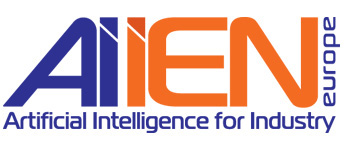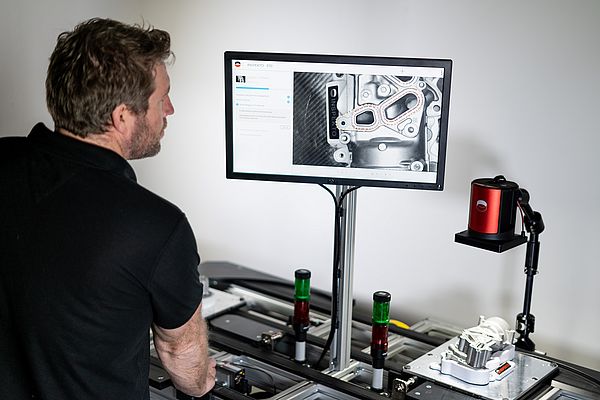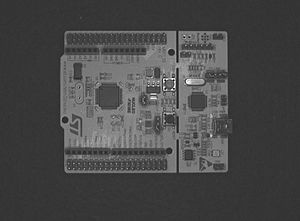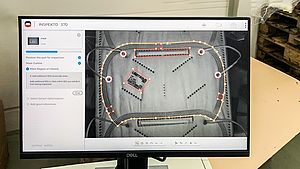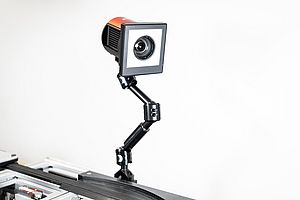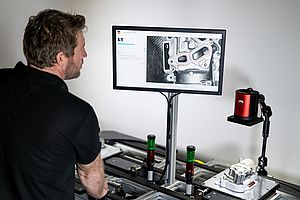The BMW plant in Steyr, Austria, is the BMW Group’s largest engine plant worldwide. At the facility, the top priorities are quality, efficiency and the transformation to Industry 4.0 through the implementation of digital technologies at shop floor level. To improve all three, plant managers embraced Autonomous Machine Vision, a new technology for quality inspection developed by German-Israeli company Inspekto.
In line with BMW’s mission to improve production processes using digitalisation, the Steyr plant has several state-of-the-art machine vision solutions in place to inspect the quality of its engines.
However, even the most sophisticated traditional machine vision solutions suffer from pseudo-errors, where the solution indicates the presence of a defect in components that were actually made to specification. This creates an extra and unnecessary loop in production, since flagged items need be conveyed to a repair station, where an employee rechecks them manually.
“The most problematic issue is that with increasing pseudo-defect rates, employees at the repair station could let their guard down and assume that an actually defected item is good,” explained David Bricher, PhD candidate and expert in innovation and digitalisation at BMW. “BMW is not willing to compromise on quality and we want to prevent this scenario at all costs.”
Democratising quality
BMW is a strong believer in bringing AI-based technologies to the shop floor, so plant managers were on the lookout for an intuitive quality assurance technology. “The BMW Start-Up Garage helps us find new companies with ground-breaking ideas to improve our processes,” said Bricher. “The team researched several companies with innovative machine vision solutions, but only Inspekto offered exactly what we were looking for — a system that is out-of-the-box, and so intuitive that any employee can set it up.”
Inspekto then introduced BMW to the world’s first Autonomous Machine Vision system, the INSPEKTO S70.
“As opposed to traditional solutions, made up of several components that are selected and assembled by a systems integrator on a project base, the INSPEKTO S70 is a self-contained product,” explained Harel Boren, CEO and co-founder of Inspekto. “This eliminates the lengthy and complex integration phases that characterise traditional machine vision projects and puts the potential of industrial inspection right where it belongs: in the hands of the QA manager.”
Convinced by the capabilities of the INSPEKTO S70, BMW Group Plant Steyr purchased four systems and started a pilot phase to check their suitability for complex applications. Following its success, the systems are now already used in two different use cases — a connector with many small, hardly visible components and a fuel pipe. In both cases, the plant has noticed an improvement in quality and a noticeable reduction of false detection instances.
The Plug & Inspect® experience
“For me, one of the most interesting characteristics of the INSPEKTO S70 is its ease of installation,” confirmed Bricher. “At BMW, one of our main targets is to bring the potential of AI closer to the production field. We want to make AI easy to understand so that it can really serve our people. We have to get rid of the mystique that surrounds the technology — people have to be able to say: I work with AI.”
This philosophy perfectly mirrors Inspekto’s mission to democratise machine vision by putting a vision inspection product directly into the hands of the people on the shop floor. Thanks to the patented Plug & Inspect® technology that powers the INSPEKTO S70, the user simply switches on the controller and ensures that the field of view (FOV) covers the location to be inspected. The user then presents an average of 20 to 30 good items to the system, which will automatically learn their characteristics.
Much like a human being, the INSPEKTO S70 knows when it has enough information about a product and informs the user that inspection can start. Anything that is different from the characteristics of a good part, that the system has ‘memorised’, will be flagged as an anomaly. “Typically, machine vision solutions require a long training process, during which they are exposed to hundreds of defective parts. But in a manufacturing environment dedicated to the highest levels of quality, we don’t have that many defective parts readily available, so we would have to produce them explicitly for training purposes,” explains Bricher. “The INSPEKTO S70 only needs good parts, which is a huge advantage. We produce good parts all the time!”
The more the merrier
The BMW Group Plant Steyr needs to inspect many different kinds of engines and parts, often on the same production line, so traditional machine vision solutions are limiting because they are developed ad hoc to inspect only one item. The INSPEKTO S70, on the contrary, can inspect an array of different products on the same production line and easily switch from one to the other, providing maximum flexibility.
The benefits of Autonomous Machine Vision are already visible at BMW Steyr. “The most important thing for us it to ship perfect engines. In this sense, the INSPEKTO S70 has already proved to be a valuable tool,” added Bricher. “The other priority is efficiency. By eliminating pseudo-defects, the system allows us to avoid the extra loop of manual double-checks.
“This also means that we will reduce costs in the long run, because employees will not waste their time rechecking components, they can instead be assigned to more productive tasks. But the more important thing for me is that with the INSPEKTO S70 we have brought AI closer to our production employees.”
